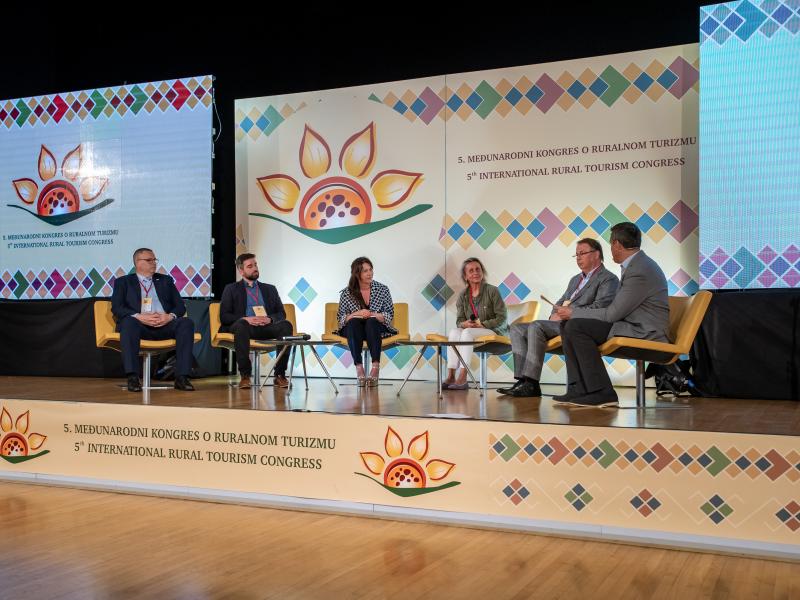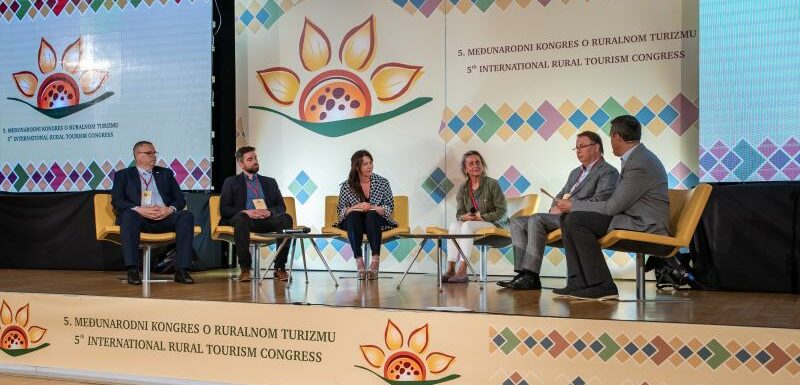„Rural Tourism: Sustainable, Digital, Inclusive“
The Croatian Association for Tourism and Rural Development, “The Village Membership Club,” member of Iter Vitis and leader of Iter Vitis Adriatic and Balkans, and the Congress Secretariat are very pleased to host numerous scientists and experts in the area of rural tourism at the 6 th International Congress on Rural Tourism from April 10 to 13, 2024, in the beautiful hotel Le Meridien Lav, Podstrana, Split.
Under the main slogan of the Congress, “Rural Tourism: Sustainable, Digital, Inclusive,” scientists, researchers, and other stakeholders in tourism are invited to participate with their scientific papers, research, presentations, or posters within the eight major thematic units, as well as their subtopics:
“European Rural Space: Yesterday, Today, Tomorrow”
“Rural Tourism: A Sustainable Alternative”
“Special Forms of Rural Tourism: New Challenges and Opportunities”
“Innovation and Rural Tourism”
“New Technologies and Use of Artificial Intelligence in Rural Tourism”
Interest Grouping and Networking in Rural Tourism”
“Challenges of Adapting Rural Tourism to Vulnerable and Underrepresented Groups”
“Challenges of Human Resource Management”.
During the Congress, a number of esteemed keynote speakers, panels, round tables, and workshops will be held, and more than 300 participants from several European countries are expected to participate.
An unmissable part of the Congress will be a visit to the charming rural areas of Split-
Dalmatia County.
The deadline for the abstract application and early bird participation fees is February 29 2024. All information about the Congress is available in English and Croatian on the webpage
kongres.klubselo.hr.
ABOUT THE CONGRESS
“The Village Membership Club” created the Rural Tourism Congress in 2007 as a result of the lack of any permanent scientific congress on rural tourism in Croatia and the wider region.
Since then, holding the congress in regular terms every two years enables continuous
exchange of experiences and knowledge; congress is a good medium for connecting science and practitioners in the field of rural tourism, agencies, tourist boards, and rural entrepreneurs.
So far, five international congresses on rural tourism have been organised, and they
represent a unique platform for the presentation of new trends, researches, and findings in the world of science, including the exchange of expert opinions. Congress, with its multidimensional and multisector dimension, opens up a space for dynamic discussions and interaction among different stakeholders in tourism, particularly in rural tourism.
Presentations and discussions within the framework of the 5th International Congress of Rural Tourism, held in 2022 in Cavtat, Croatia, focused on the peculiarities of rural tourism in Croatia, which were especially emphasised in the presentations during the “Best Examples” session, through which fourteen successful examples from practice were presented. It was concluded that rural areas represent a new possibility for Croatian tourism since there is a growing interest in undiscovered and authentic tourist destinations that offer contact with nature, a break from busy everyday life, and an authentic local tourist experience.
As a result of presentations and constructive discussions, the collection of scientific papers was created, which contains 42 scientific and 19 professional works by authors from Croatia, Slovenia, Romania, Ukraine, Bosnia and Herzegovina, Montenegro, Serbia, and Greece.
Rural tourism provides a developmental perspective for rural areas as it produces positive economic but also social effects. New business opportunities, the revitalization of traditional industries whose products find a market in tourism, the interconnection of value chains, and the revitalization of agriculture promote demographic changes and help keep the population in rural areas. Rural tourism is closely linked with agriculture, with family farms playing a particularly important role as the “guardians” of the rural space. Rural tourism provides them with a market for their products that has multiple significances.
In the circumstances of the COVID-19 pandemic and the global decline in demand for
tourism, rural tourism proved remarkably resilient. The change in awareness, preferences,
and motives, increased concerns about health and safety, and the focus on outdoor
experiences, open spaces, and uncrowded destinations and/or spots are indicative of
potential for even better valorisation of rural spaces in tourism going forward. A more
complete valuation, reconstruction, and protection of tourism potentials, as well as the
development of an integral tourism product, are associated with the implementation of a programme that seeks to revitalise the rural space through a rural tourist destination development and branding ram.
Rural tourism is an important factor in the reactivation of natural and cultural resources and in the sustainable development of rural spaces, helping safeguard the local identity, tradition, and customs, protecting the environment, strengthening autochthonous, traditional, and organic agricultural production, and developing rural areas in line with the principles of sustainable development. It can therefore be justly dubbed the future of global tourism.

